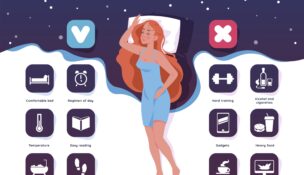UnitedHealthcare is dedicated to helping people live healthier lives and making the health system work better for everyone. UnitedHealthcare offers the full spectrum of health benefit programs for individuals, employers and Medicare and Medicaid beneficiaries, and contracts directly with over 1.3 million physicians and care professionals, and more than 6,000 hospitals and other care facilities nationwide.
Anxiety-fighting foods that may help bring calm, balance
Stressed or anxious about work? How fixing your diet might help
UnitedHealthcare Staff Writer //November 22, 2019//


Anxiety-fighting foods that may help bring calm, balance
Stressed or anxious about work? How fixing your diet might help
UnitedHealthcare Staff Writer //November 22, 2019//

One-third of adults in the United States experience an anxiety disorder at some point in their lives, according to the National Institute of Mental Health. Managing the disorder can often feel overwhelming, but a growing body of evidence shows our eating habits may be one place to start.
While diet changes alone cannot cure anxiety, well-balanced meals and drinking enough water can be a great place to start to relieve stress and worry, as keeping blood sugar stable may help create a calmer feeling.
For example, complex carbohydrates such as whole grains are thought to increase the amount of serotonin in your brain, which can make you feel even-keeled and relaxed. The Mayo Clinic recommends steering clear of foods with simple carbohydrates, like sugary foods and drinks, as well as limiting alcohol and caffeine. A sugar rush, alcohol or caffeine can precipitate or mimic anxiety-symptoms.
Diving deeper, a healthy gut can promote a calm mind, so taking care of our GI tract is another way to help regulate mood and imbalances. Some studies show a healthy diet can promote the function known as the gut-brain network, where microorganisms in the digestive tract are linked to important pathways to the brain.
The gut-brain network serves as a bodyguard for our immune and neurological systems. About 95% of serotonin receptors, which are key to stabilizing mood and brain function, are also found in the lining of the gut. According to a Harvard Medical School health blog, research is examining the potential of probiotics for treating both anxiety and depression by boosting good bacteria in the gut.
While you should talk to your doctor to explore your individual nutritional needs and the recommended anxiety treatment for you, specific nutrient-rich foods have been shown to help reduce anxiety:
- Magnesium: Nuts, legumes, whole grains and dark leafy greens, like spinach and swiss chard, are abundant sources of magnesium, which has been shown to help lessen anxiety and improve stress.
- Zinc: The mineral found in oysters, cashew, liver, beef and egg yolks is also linked to lowered anxiety, as zinc plays a key role in the central nervous system.
- Omega-3 fatty acids: Studies by the JAMA Network have shown that Omega-3 fatty acids found in salmon or fish oils have shown therapeutic effects on anxiety and depression in some people.
- Probiotic-rich foods: Probiotics can boost those beneficial microorganisms in the gut. Fermented foods like pickles, kefir and sauerkraut may introduce good bacteria to protect the body against the harmful effects of stress.
- Dark chocolate: Chocolate lovers can rejoice, because studies show dark chocolate, which has less added sugars, can take a bite out of stress by helping to improve mood and reduce the stress hormone cortisol, which can be linked to anxiety.
- Asparagus: The stalky green vegetable comes with another surprising nutritional benefit. The Chinese government approved the use of asparagus extract as a natural functional food to help lower anxiety.
- Antioxidants: Blueberries, strawberries, apples, prunes, plums, acai, walnuts, pecans, beans and broccoli are all examples of foods designated high in antioxidants by the USDA.
Last, a food journal or app may also offer a helpful overview of your food intake and bring an overall awareness of how you nourish your body and mind. Tracking meals may give insight of how your diet can play a dynamic role in mood and brain chemistry and help ease the burden of anxiety.






















